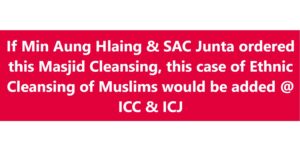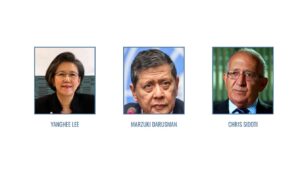Legal Memorandum for International and Domestic Human Rights Authorities
Subject: Unlawful Sealing and Dispossession of the Historic Guard Dan Masjid in Sagaing — Legal Basis for International Action
To:
A. UN High Commissioner for Human Rights (OHCHR)
B. International Criminal Court (ICC) and International Court of Justice (ICJ)
C. National Unity Government (NUG), National Unity Consultative Council (NUCC), Sagaing Region People’s Defense Forces (PDF)
Date: 29th. May 2025
Prepared by: MMNN Legal Affairs Committee
Contact: [email protected]
I. Overview
This memorandum calls for urgent international review and legal response regarding the illegal sealing and attempted seizure of the Guard Dan Masjid in Sagaing, Myanmar. This act, executed by the Sagaing District Police Chief on 25 June 2025, reflects a pattern of systemic religious discrimination and potentially a premeditated campaign of ethnic and religious cleansing. These actions violate multiple instruments of international law, including the Rome Statute, UDHR, and Geneva Conventions, and demand thorough investigation and intervention.
II. Historical and Legal Context
- Founding and Religious Significance:
- The Guard Dan Masjid was built on land purchased and donated in 1902 by Police Officer Abdul Rahim Baksh, who received a Bravery Medal from the British Indian Governor. He also financed a nearby police station, serving as an early symbol of interfaith service.
- His descendant and Masjid trustee, Officer Md. Ullah, received a Bravery Award from President Dr. Ba Oo in 1954.
- The Masjid was damaged in the 1956 Sagaing earthquake and subsequently rebuiltby the Myanmar Muslim Abdul Latif Khan @ U Khin Maung Latt, then Minister of Home Affairs and Religious Affairs.
- Legal Recognition and Prior Attempts at Confiscation:
- A prior attempt during General Khin Nyunt’s government to confiscate the mosque was halted after documentary proof of ownership and religious designation was submitted.
- Recent Events:
- Despite submission of full land ownership documents and payment of MMK 5,000,000 to secure building permissions, the Sagaing District Police Chief sealed the mosque on 25 June 2025.
- Trustees traveled to Naypyidaw to engage with officials in good faith, indicating no lawful justification exists for the sealing.
III. Legal Framework and International Obligations
- Universal Declaration of Human Rights (UDHR):
- Article 18: Right to freedom of religion.
- Article 17: Right to property without arbitrary deprivation.
- International Covenant on Civil and Political Rights (ICCPR):
- Article 18 & 27 (Minority protections and religious freedom). Customary international law principles are applicable even without Myanmar’s ratification.
- Rome Statute of the International Criminal Court:
- Article 7: Crimes against humanity — persecution on religious grounds.
- Article 8: War crimes — targeting protected cultural and religious property.
- Geneva Conventions:
- Applicable in internal conflicts — religious sites are to be protected from attack or unlawful appropriation.
- UN Declaration on the Rights of Minorities (1992):
- Reaffirms protection of religious and cultural institutions of minorities.
- Buddha’s Seven Principles for Non-Decline (‘Aparihāniya Dhamma’)
- No 6. Reverence for Religious Places
Respecting monasteries, temples, and sacred spaces contributes to moral and spiritual integrity.- (These seven principles are timeless ethical guidelines shared by the Buddha to ensure the prosperity and enduring strength of any community. Their relevance applies not only to Buddhist societies but to all humanity striving for peace, justice, and resilience.)
- No 6. Reverence for Religious Places
IV. Patterns of Systemic Discrimination and Religious Persecution
- Since 1962, the Myanmar military has consistently obstructed construction, repair, or registration of Muslim religious sites, often demanding bribes for permits.
- In contrast, Buddhist and Hindu religious buildings are regularly permitted to rebuild or expand after natural disasters without restriction.
- The current policy of limiting Masjid reconstruction to “original size and form” while granting other faiths broader freedom violates the principle of equal treatment.
V. Legal Concerns and Potential Violations
- Arbitrary Closure of Worship Site: No legal process was followed for sealing the Guard Dan Masjid.
- Violation of Equal Religious Rights: Discriminatory enforcement of rebuilding permissions.
- Cultural and Religious Erasure: If state-ordered, this could be part of a broader ethnic cleansing strategy.
- Breach of Trust and Disregard for Historical Significance: The Masjid’s historical and interfaith importance has been blatantly ignored.
VI. Demands and Recommendations
- Immediate Unsealing and Restoration:
- The Guard Dan Masjid must be reopened and permitted to rebuild in accordance with architectural safety and congregational needs.
- Criminal Investigation:
- If the order was issued by the SAC Junta or Min Aung Hlaing, international legal mechanisms including the ICC must evaluate the action as part of systemic religious targeting.
- Accountability of Police Officials:
- If the District Police Chief acted independently, the SAC should discipline him for overstepping authority and disobeying constitutional guarantees of religious freedom.
- Civil Society and Resistance Movements:
- We urge NUG, NUCC, and Sagaing Region PDF to clearly voice opposition to this action and commit to protect all minority faiths under any future democratic framework.
- International Monitoring and Documentation:
- OHCHR and ASEAN should ensure transparent, impartial assessment of earthquake-damaged religious buildings across all faiths.
- IIMM and relevant ICC observers should investigate and archive evidence of the Guard Dan Masjid case for formal proceedings.
- Designation as a Heritage Site:
- Based on its century-old legacy and civic importance, the Guard Dan Masjid should be nominated as a protected cultural heritage site under international law.
Conclusion
The illegal sealing of the Guard Dan Masjid represents not only a clear violation of religious freedoms but a dangerous precedent of state-backed or state-enabled religious erasure. If allowed to persist, this act will contribute to the historical persecution of Myanmar Muslims and reinforce impunity among perpetrators.
Whether executed independently or on junta orders, this action demands immediate reversal, legal accountability, and international response.
Submitted by: Legal Desk, Myanmar Muslims News Network (MMNN)
Contact: [email protected]
Distribution: OHCHR | ICC | ICJ | NUG | NUCC | ASEAN | OIC | IIMM | Civil Society Observers






